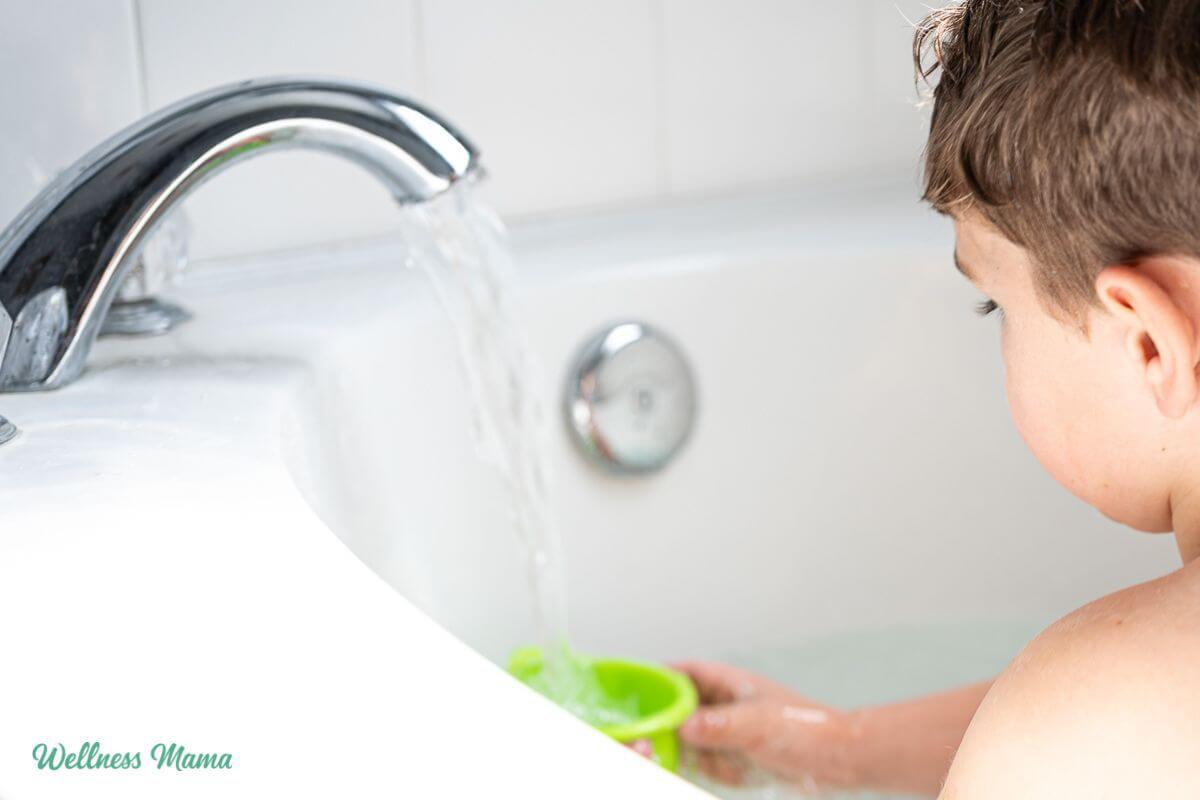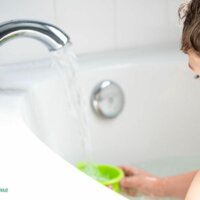Regular tap water can be a source of many chemicals from chlorine to fluoride and many others. We have a water filter for our drinking water, so why not have a bath water filter too?
Thoughts on Bath Water Filters
I’ve gotten lots of water filters over the years. While I still use the drinking water filter, I’ve added a whole house filter too. This helps further reduce contaminants throughout the home.
For showering and bathing, we also use shower filters on our shower heads. When my kids were younger and taking baths though, I wanted a good option for bath water. They’re not easy to find! I told my dad (an engineer) that he needs to work on one of these. I’m thankful that Canopy recently created one that I use on our bathtubs. (click for discount)
Step one was switching out the water filter. Step two was to switch to more natural bath products. Even homemade bath bubbles helped. Still, I knew I wanted to do something more.
Toxins in Bath Water?
While the EPA regulates water quality in the US, there’s still plenty to be desired. High levels of heavy metals, like lead from old pipes, can cause problems. Then there are the PFAS (forever chemicals), pesticides, and other contaminants.
What’s added to public drinking water isn’t any better. Fluoride is a known neurotoxin. And chlorine is a poisonous gas. While the idea is that diluted amounts aren’t harmful, that may not be the case.
Most municipal water supplies use chlorine to help reduce pathogens in the water. Some combine chlorine with ammonia or add fluoride. These chemicals are known to increase the risk of asthma, allergies, breathing problems, cancer, and more. They’re toxic when ingested or absorbed through the skin.
Children: A Special Concern
Unfortunately, this puts children most at risk. Some children bathe for 45 minutes or more several nights a week. They also have a larger surface-area-to-body-weight ratio and may absorb chemicals more quickly. They can also be more severely affected by them.
Children’s tissues, organs, and biological systems are still developing. They go through several stages of rapid growth and development from infancy to adolescence. These factors make it so children are likely to have more issues with toxins. Especially at certain age ranges.
Types of Shower & Bath Filtration
We don’t want our kids soaking in a toxic soup, but what can we do about it? And on the occasion I take a relaxing soak, I don’t want to bathe in toxins either!
There are several different options, depending on your preference and budget. For people with rust and really hard water, a water softener is a great first step. Culligan is one popular option. This is more common with well water. Tap water in cities is more likely to have added fluoride and chlorine to it.
Whole House Filter
One of the best ways to get out toxins is with a whole-house water filter system. This water filtration system helps clean water before it even gets to the tub. Here’s the one we have. For added protection, you can pair this with a faucet water filter or shower filter.
Bath Ball Filter
These are a popular option that are budget-friendly. The bath ball hangs on the bathtub faucet and filters the water as it flows through. The filtration media in it can catch sediment and neutralize chlorine. Some popular brands are Crystal Quest and Sprite. Replacement filter cartridges vary in price and quality. Crystal Quest bath filters claim to remove a much wider variety of contaminants.
One common complaint is bath ball filters don’t do well with hard water. Another issue is they don’t work well with the flow rate of certain tubs. The fast water flow can spill over the sides, leaving some water unfiltered.
I like using this bath ball de-chlorinator instead. You just swish it around in the water for 5-8 minutes before getting in. This water purifier is good for over 200 baths and uses vitamin C as the filter media.
Shower Filter
We also have a shower filter the kids and I use. If you have a good shower filter you can also use that to fill up your tub. It takes longer though and the water may not be as warm by the time you get to it. This is the bath tub filter that we use.
Here’s what else I do to reduce chemicals in our bath water.
Vitamin C to Reduce Bath Toxins
Carbon block filters remove chlorine, but they can be tough to use for shower and bath water. I have a countertop filter that uses carbon for drinking water. You can also find them in under sink water filter options.
A simpler option is to use Vitamin C. Vitamin C is great for the immune system, but it can also play a role in reducing bath water chemicals and chlorine. It also helps with chloramine (chlorine and ammonia). These chemicals are often used in treating water and can be more dangerous than chlorine alone.
Two forms of Vitamin C will work to neutralize chlorine more effectively:
- Ascorbic Acid form of Vitamin C
- Sodium Ascorbate form of Vitamin C
Personally, I prefer to use sodium ascorbate since it has less of an effect on the pH. But either form will work. I use a teaspoon of either of the above per tub of water. It’s best to put the powder in for 2-5 minutes before getting in the bath to allow it time to work.
If you aren’t a fan of adding powder to the bath each time, there’s another option. The bath ball de-chlorinator mentioned earlier does the same thing.
Adsorbent Clay
Healing clays (like Bentonite clay) bind to heavy metals in the body and help remove them. They’re used as an adsorbent even across industrial and agricultural industries. This same process happens on the skin, and many people use it in detox baths.
One of my favorites is Bentonite Clay (from a previous post):
“Bentonite Clay is a unique clay due to its ability to produce an “electrical charge” when hydrated. Upon contact with fluid, its electrical components change, giving it the ability to absorb toxins. Bentonite is known for its ability to absorb and remove toxins, heavy metals, impurities, and chemicals.”
I use Bentonite Clay to detox my hair and as a “shampoo” of sorts. I also regularly add bentonite clay to my kids’ baths after removing the chlorine.
Note: Don’t use metal when dealing with Bentonite, as it makes it less effective. I mix 2 tablespoons of Bentonite clay with water in a glass jar with a plastic lid and shake well. I then pour this into the bath after the chlorine has been removed. The two types of clay I personally use and have good results with are:
Salts & Minerals
While these don’t reduce toxins in bath water, they help add nutrients back in. I’ve written before (a lot) about magnesium (tired of hearing about it yet?). Due to depleted soil levels of magnesium and synthetic fertilizers, many of us don’t get enough magnesium. One of the easiest ways to help kids avoid this problem is to add these minerals to their bath water.
One 2016 study examined how well magnesium is absorbed through the skin. The researchers found magnesium levels increased in the skin starting at the 15-minute mark.
I regularly add a cup of Epsom salts or magnesium flakes and a few tablespoons of Himalayan salt to my kid’s baths. When I have the time, I take a relaxing bath in this mixture also. Ideally, you’ll want to soak for at least 15 minutes for the best results.
When I don’t have time for a bath, magnesium oil also helps. I notice the benefits of transdermal magnesium (baths or magnesium oil) much more quickly than when I take internal forms of magnesium.
Relaxing Magnesium Bath Salts
Equipment
Materials
- 1 cup magnesium flakes (or Epsom salts)
- ½ cup Himalayan salt (or sea salt)
- ½ tsp vanilla extract (optional, for scent)
- 10-15 drops essential oils (optional, I like lavender and mint)
Instructions
- Mix the salt and magnesium together in the jar.
- Sprinkle the vanilla and essential oil on top (if using). These are optional, but add a nice scent and some added health benefits.
- Add the entire mixture to a warm bath and soak for at least 20 minutes (30 is even better).
Notes
- I try to make time for a relaxing bath at least once a week.
- When my kids were little I added it to their bath each night, (plus some homemade bubble bath).
For intensive therapy (illness, eczema, etc.) you can take a magnesium bath every day. But check with your doctor first if you have any medical conditions.
So to recap, here are the steps I do to reduce toxins in our bathwater:
- Use a whole house filter
- Use sodium ascorbate powder or a de-chlorinator ball (when we had municipal water)
- Add bentonite clay to the bath
- Add magnesium with magnesium flakes and Epsom salts
Do you use a bath water filter? Do you add anything to your kid’s bath water? Leave a comment and let me know!





Leave a Reply